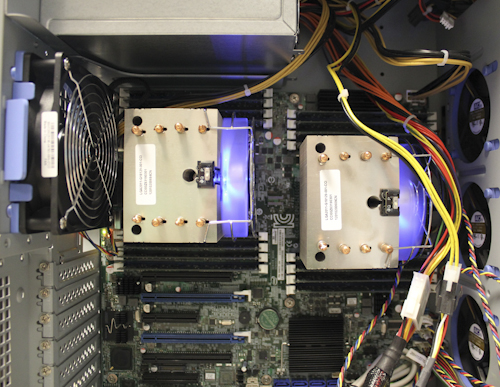TEST BENCH AND PROTOCOL
 In testing the HGST SSD800MM, along with all enterprise drives, we focus on long term stability. In doing so, we stress products not only to their maximum rates, but also with workloads suited to enterprise environments.
In testing the HGST SSD800MM, along with all enterprise drives, we focus on long term stability. In doing so, we stress products not only to their maximum rates, but also with workloads suited to enterprise environments.
We use many off-the-shelf tests to determine performance, but we also have specialized tests to explore specific behaviors we encounter. With enterprise drives, you will see that we do not focus on many consumer level use-cases.
Our hope is that we present tangible results that provide relevant information to the buying public.
When testing the SA-ENC12G-01A, we actually have a concrete set of data that we are trying to match. Our test setup is almost identical to our Adaptec ASR-8885 review. The only difference is the SA-ENC12G-01A. In an ideal world, the results would be identical, but with additional connectors and backplanes, we expect at least a slight dip in performance.
MEASURING PERFORMANCE
As with all of our tests, the following tests were performed after a secure erase of the drive. The drive was also conditioned with a predefined workload until it reached steady state. We also test across the entire span of the drive.
With our sequential tests, we saw everything that we have come to expect from the HGST SSDs. Introducing the SA-ENC12G-01A into the mix resulted in a roughly 5% drop in performance. At lower queue depths, the results were much closer, but averaged out to 5% at higher queue depths. Even though the difference was measurable, it was so small, it could easily be written off as variance in the drives over time.
With 4K random operations, the differences were even smaller. Writes were almost identical across all queue depths. The only anomaly was 4K reads at high queue depths. While we were able to get 700K IOPS directly connected, we could only get 535K IOPSs with the Serial Cables solution.
Overall, the convenience of using the SA-ENC12G-01A completely outweighed the minimal performance hit. We do wish that we would have been able to hit the 700K read IOPS that we had previously achieved.
REPORT ANALYSIS AND CONCLUSION
The SA-ENC12G-01A offers customers 8 bays of direct attached storage in a small, refined and unique form-factor. Running across the cable is 12Gbps SAS, which the SA-ENC12G-01A was explicitly designed for. Data path redundancy and the option for rack mounting adds to its enterprise credentials.
We wish there was something that could be done about the noise. As we stated earlier, it is incredibly loud. Even something as simple as a high/low fan speed switch would have made the noise more bearable. But, as we found out, the fan did an excellent job of keeping our SSDs cool. Even though the HGST drives draw a lot of power, the SA-ENC12G-01A had absolutely no problems keeping them cool. In the end, if we had to choose, we would take the louder enclosure with superior cooling than a quiet enclosure with overheating drives.
Noise was really the only substantial complaint that we had. Overall, it was a very good product that is close to being great. With pricing at $899, you will end up paying the early adopter tax that is being applied to all 12Gbps SAS products, but we would expect that to go down over time as SAS 3.0 becomes more mainstream.
 The SSD Review The Worlds Dedicated SSD Education and Review Resource |
The SSD Review The Worlds Dedicated SSD Education and Review Resource | 

Nice concept product but if I’m running a production shop I’ll be looking for something with a redundant PS and fan. The site states that a 1-year warranty is offered but you really need one that features longer coverage and onsite service, not a return-to-factory one. I’m sure the big boys; HP, Dell and IBM, will release their own versions when 12G SAS picks up some more steam.
Good catch on the warranty. The lack of redundant PS is one of the reasons why this isn’t quite a full data center product, it is something in between.
This product was designed and built for HDD/SSD testing environments and not data center applications. Many HDD/SSD MFG’s were chasing signal integrity/10b errors only to find that it was either the cable or the enclosure that wasn’t up to par for 12Gb/s applications. Also, this is a direct attach box so there’s no expanders or anything else to get in the way to true, 12Gb/s testing and performance. When the big box guys come out with their 12Gb/s solutions they will include redundant power supplies, expander chips and onsite warranty services and they won’t cost under $1000.00. The audience for this will plug and unplug thousands of drives over the life cycle of this JBOD and this was intentionally designed for that segment of the storage marketplace.